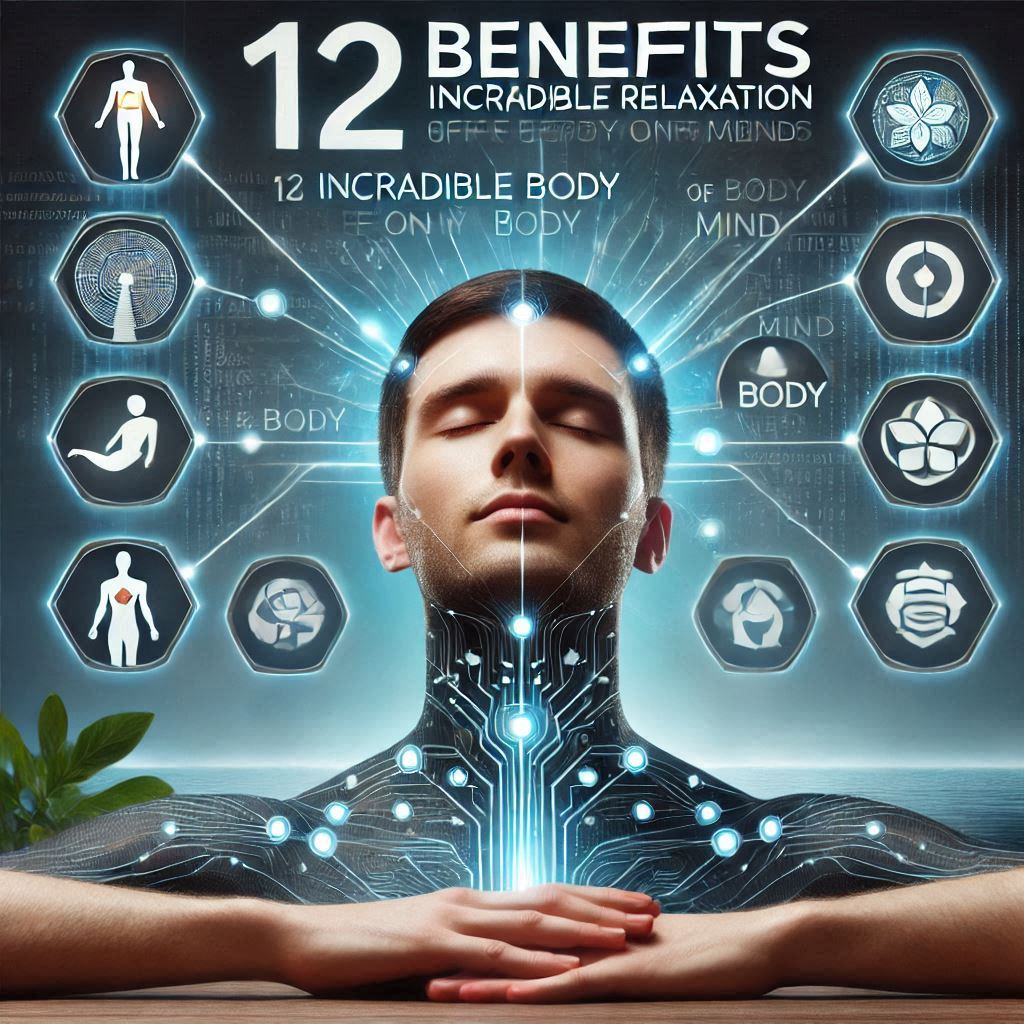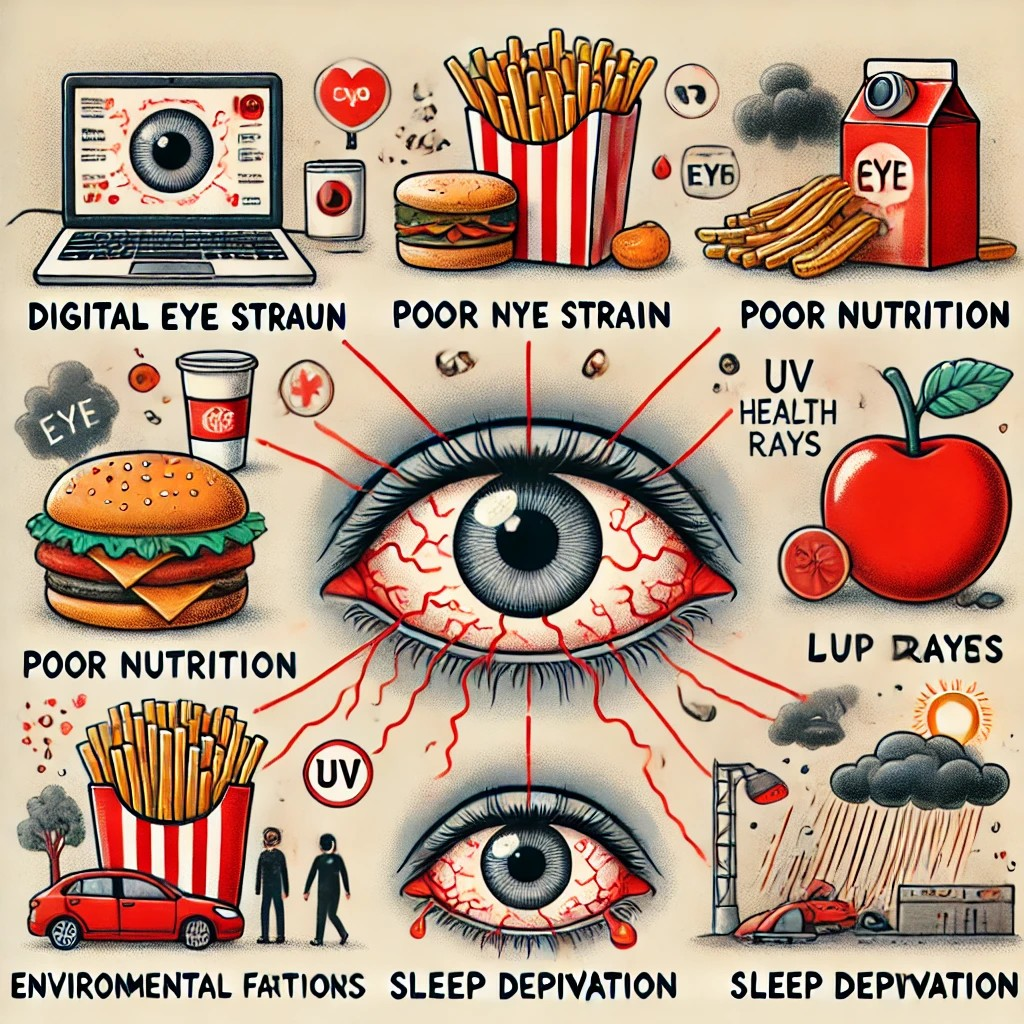
“Benefits: 12 Amazing Body and Mind Relaxations”
12 Amazing Benefits of Relaxation for Body & Mind
Discover the benefits of relaxation for your body and mind. Learn how relaxation can enhance well-being, reduce stress, and promote mental clarity for a healthier lifestyle.


Introduction
Overview of the Importance of Relaxation for Overall Health
Relaxation is a vital component of overall health and well-being. It helps to counteract the negative effects of stress, which can have a profound impact on both the body and mind. By incorporating relaxation techniques into your daily routine, you can improve your physical health, enhance your mental clarity, and promote a sense of inner peace.
Brief Explanation of How Relaxation Impacts Both Body and Mind
Relaxation techniques, such as deep breathing, meditation, and progressive muscle relaxation, work by activating the body’s natural relaxation response. This response helps to lower heart rate, reduce blood pressure, and decrease the production of stress hormones. As a result, relaxation can alleviate physical tension, improve mood, and enhance cognitive function.
Benefit 1: Reduces Stress
Explanation of How Relaxation Techniques Lower Stress Levels
Relaxation techniques are effective in lowering stress levels by engaging the parasympathetic nervous system, which is responsible for the body’s rest-and-digest functions. When you practice relaxation techniques, your body shifts from a state of heightened arousal (associated with the fight-or-flight response) to a state of calm and relaxation. Here are some common relaxation techniques and how they help reduce stress:
- Deep Breathing: Deep breathing exercises involve taking slow, deep breaths to increase oxygen intake and promote relaxation. This technique helps to calm the nervous system, reduce heart rate, and lower blood pressure. By focusing on your breath, you can also divert your attention away from stressors and create a sense of calm.
- Meditation: Meditation involves focusing your mind on a particular object, thought, or activity to achieve a mentally clear and emotionally calm state. Regular meditation practice can reduce the production of stress hormones, such as cortisol, and increase the production of feel-good hormones, such as serotonin. This helps to alleviate stress and improve overall mental well-being.
- Progressive Muscle Relaxation: This technique involves tensing and then slowly releasing different muscle groups in the body. By doing so, you can release physical tension and promote a sense of relaxation. Progressive muscle relaxation helps to reduce muscle stiffness and pain, which are often associated with stress.
- Visualization: Visualization, or guided imagery, involves imagining a peaceful and calming scene. This technique helps to distract the mind from stressors and create a sense of tranquility. Visualization can lower heart rate and blood pressure, promoting a state of relaxation.
Importance of Stress Reduction for Mental and Physical Health
Reducing stress is crucial for maintaining both mental and physical health. Chronic stress can lead to a variety of health problems, including:
- Mental Health Issues: Prolonged stress can contribute to the development of mental health disorders, such as anxiety and depression. It can also impair cognitive function, leading to difficulties with concentration, memory, and decision-making.
- Cardiovascular Problems: Chronic stress is associated with an increased risk of heart disease, high blood pressure, and stroke. Stress can cause inflammation in the arteries, leading to the buildup of plaque and narrowing of blood vessels.
- Immune System Suppression: Stress can weaken the immune system, making the body more susceptible to infections and illnesses. It can also slow down the healing process and increase the risk of chronic diseases.
- Digestive Issues: Stress can affect the digestive system, leading to problems such as irritable bowel syndrome (IBS), acid reflux, and stomach ulcers. It can also disrupt appetite and eating patterns, contributing to weight gain or loss.
- Musculoskeletal Problems: Stress can cause muscle tension and pain, particularly in the neck, shoulders, and back. This can lead to chronic pain conditions and reduced mobility.
By incorporating relaxation techniques into your daily routine, you can effectively manage stress and improve your overall health and well-being. Regular practice of relaxation techniques can help you build resilience to stress, enhance your mood, and promote a sense of inner peace.
Read also: “10 Best Practices for Urology Care.”

Benefit 2: Enhances Mental Clarity
How Relaxation Improves Focus and Cognitive Function
Relaxation techniques can significantly enhance mental clarity by reducing stress and anxiety, which often cloud our thinking and decision-making abilities. When the body is relaxed, the brain can function more efficiently, leading to improved focus, better memory, and enhanced cognitive function. Here’s how relaxation contributes to mental clarity:
- Reduces stress hormones: Stress hormones like cortisol can impair cognitive function and memory. Relaxation techniques help lower cortisol levels, allowing the brain to operate more effectively.
- Increases Blood Flow to the Brain: Relaxation practices such as deep breathing and meditation increase blood flow to the brain, providing it with more oxygen and nutrients, which enhances cognitive performance.
- Promotes Neuroplasticity: Relaxation can promote neuroplasticity, the brain’s ability to reorganize itself by forming new neural connections. This is crucial for learning, memory, and overall cognitive function.
Examples of Relaxation Practices That Boost Mental Clarity
- Meditation: Regular meditation practice can improve attention span, memory, and cognitive flexibility. It helps clear the mind of distractions and enhances focus.
- Deep Breathing Exercises: Deep breathing increases oxygen supply to the brain, which can improve concentration and mental clarity.
- Yoga: Yoga combines physical postures, breathing exercises, and meditation, all of which contribute to reduced stress and improved mental clarity.
- Mindfulness: Practicing awareness involves paying attention to the present moment without judgment. This can help reduce mental clutter and improve focus.

Benefit 3: Improves Sleep Quality
Connection Between Relaxation and Better Sleep
Relaxation techniques are highly effective in improving sleep quality. Stress and anxiety are common culprits of sleep disturbances, and relaxation helps to calm the mind and body, making it easier to fall asleep and stay asleep. Here’s how relaxation impacts sleep:
- Reduces anxiety: Relaxation techniques help reduce anxiety, which is a major barrier to falling asleep. A calm mind is more conducive to restful sleep.
- Lowers Heart Rate and Blood Pressure: Relaxation lowers heart rate and blood pressure, creating a state of physical calm that is ideal for sleep.
- Promotes the Release of Sleep Hormones: Relaxation can promote the release of melatonin, the hormone responsible for regulating sleep-wake cycles.
Tips for Incorporating Relaxation into Bedtime Routines
- Establish a Relaxing Pre-Sleep Routine: Engage in calming activities such as reading, taking a warm bath, or listening to soothing music before bed.
- Practice Deep Breathing: Spend a few minutes practicing deep breathing exercises to calm your mind and body.
- Try Progressive Muscle Relaxation: This involves tensing and then relaxing each muscle group in your body, starting from your toes and working up to your head.
- Meditate Before Bed: A short meditation session can help clear your mind of the day’s stresses and prepare you for sleep.
Benefit 4: Boosts Immune System
How Relaxation Supports Immune Function
Relaxation techniques can boost the immune system by reducing stress, which is known to suppress immune function. Chronic stress can lead to increased susceptibility to infections and illnesses. Here’s how relaxation supports immune health:
- Reduces stress hormones: High levels of stress hormones like cortisol can weaken the immune system. Relaxation helps lower these hormone levels, allowing the immune system to function more effectively.
- Promotes Healthy Sleep: Good sleep is essential for a strong immune system. Relaxation techniques improve sleep quality, which in turn supports immune health.
- Enhances Lymphatic Function: Relaxation can improve lymphatic circulation, which is crucial for removing toxins and supporting immune function.
Importance of a Strong Immune System for Overall Health
A strong immune system is essential for protecting the body against infections, diseases, and other health issues. It helps the body recover more quickly from illnesses and reduces the risk of chronic diseases. By incorporating relaxation techniques into your daily routine, you can support your immune system and improve your overall health.

Benefit 5: Lowers Blood Pressure
Explanation of How Relaxation Techniques Can Reduce Blood Pressure
Relaxation techniques can effectively lower blood pressure by promoting a state of calm and reducing the body’s stress response. Here’s how they work:
- Activates the Parasympathetic Nervous System: Relaxation activates the parasympathetic nervous system, which helps lower heart rate and blood pressure.
- Reduces stress hormones: Lower levels of stress hormones like cortisol and adrenaline result in reduced blood pressure.
- Improves Blood Vessel Function: Relaxation can improve the function of blood vessels, making them more flexible and reducing resistance to blood flow.
Long-Term Benefits of Maintaining Healthy Blood Pressure Levels
Maintaining healthy blood pressure levels is crucial for long-term health. It reduces the risk of heart disease, stroke, and kidney problems. By incorporating relaxation techniques into your daily routine, you can help keep your blood pressure in check and enjoy better overall health.
Benefit 6: Alleviates Pain
How Relaxation Can Help Manage and Reduce Pain
Relaxation techniques can be highly effective in managing and reducing pain. When the body is relaxed, it releases endorphins, which are natural painkillers. Additionally, relaxation helps to reduce muscle tension, which can alleviate pain caused by muscle stiffness and spasms. By calming the nervous system, relaxation techniques can also decrease the perception of pain and improve overall comfort.
Examples of Relaxation Methods Used for Pain Relief
- Deep Breathing: Deep breathing exercises help to oxygenate the body and promote relaxation, which can reduce pain and discomfort.
- Progressive Muscle Relaxation: This technique involves tensing and then relaxing different muscle groups, which can help release physical tension and alleviate pain.
- Meditation: Meditation can help shift focus away from pain and promote a sense of calm and well-being.
- Visualization: Guided imagery or visualization involves imagining a peaceful and pain-free environment, which can help distract the mind from pain.
- Yoga: Yoga combines physical postures, breathing exercises, and meditation, all of which can help reduce pain and improve flexibility and strength.
Benefit 7: Enhances Mood
Impact of Relaxation on Mood and Emotional Well-Being
Relaxation techniques can have a profound impact on mood and emotional well-being. By reducing stress and anxiety, relaxation helps to improve overall mood and promote a sense of happiness and contentment. Relaxation also increases the production of serotonin and dopamine, which are neurotransmitters associated with feelings of well-being and pleasure.
Techniques for Using Relaxation to Improve Mood
- Mindfulness Meditation: Practicing mindfulness meditation can help you stay present and focused, reducing negative thoughts and improving mood.
- Deep Breathing: Deep breathing exercises can help calm the mind and reduce feelings of anxiety and stress.
- Aromatherapy: Using essential oils such as lavender, chamomile, and bergamot can promote relaxation and improve mood.
- Exercise: Physical activity, such as yoga or tai chi, can help release endorphins and improve mood.
- Listening to Music: Listening to calming and uplifting music can help reduce stress and enhance mood.
Benefit 8: Promotes Heart Health
Connection Between Relaxation and Cardiovascular Health
Relaxation techniques can significantly benefit cardiovascular health by reducing stress, which is a major risk factor for heart disease. When the body is relaxed, blood pressure and heart rate decrease, reducing the strain on the heart. Relaxation also helps to improve blood flow and reduce inflammation, which are important for maintaining a healthy cardiovascular system.
Benefits of Relaxation for Heart Health
- Lowers Blood Pressure: Relaxation techniques help to lower blood pressure, reducing the risk of hypertension and heart disease.
- Reduces Heart Rate: A lower heart rate reduces the workload on the heart and decreases the risk of heart-related issues.
- Improves Blood Flow: Relaxation promotes better circulation, which is essential for delivering oxygen and nutrients to the heart and other organs.
- Reduces inflammation: Chronic stress can lead to inflammation, which is a risk factor for heart disease. Relaxation helps to reduce inflammation and protect heart health.
Benefit 9: Increases Energy Levels
How Relaxation Can Boost Energy and Reduce Fatigue
Relaxation techniques can help boost energy levels by reducing stress and promoting better sleep. When the body is relaxed, it can recover more effectively, leading to increased energy and reduced fatigue. Relaxation also helps to improve mental clarity and focus, which can enhance overall productivity and energy levels.
Tips for Incorporating Relaxation into Daily Routines for More Energy
- Take Short Breaks: Incorporate short relaxation breaks throughout the day to recharge and reduce stress.
- Practice Deep Breathing: Spend a few minutes each day practicing deep breathing exercises to increase oxygen intake and boost energy.
- Engage in Physical Activity: Regular exercise, such as yoga or walking, can help reduce stress and increase energy levels.
- Get Adequate Sleep: Prioritize excellent sleep hygiene and incorporate relaxation techniques into your bedtime routine to improve sleep quality.
- Stay Hydrated: Drink plenty of water throughout the day to stay well-hydrated and maintain energy levels.
Benefit 10: Supports Digestive Health
Explanation of How Relaxation Aids Digestion
Relaxation techniques can support digestive health by reducing stress, which is known to negatively impact the digestive system. When the body is relaxed, the parasympathetic nervous system is activated, promoting the rest-and-digest response. This helps to improve digestion, reduce symptoms of digestive disorders, and promote overall gut health.
Importance of Relaxation for Maintaining a Healthy Digestive System
- Reduces stress-related digestive issues: Stress can exacerbate conditions such as irritable bowel syndrome (IBS) and acid reflux. Relaxation helps to reduce stress and alleviate these symptoms.
- Improves Gut Motility: Relaxation promotes better gut motility, which is essential for the smooth movement of food through the digestive tract.
- Enhances Nutrient Absorption: A relaxed digestive system is more efficient at absorbing nutrients from food, supporting overall health.
- Reduces Inflammation: Chronic stress can lead to inflammation in the gut. Relaxation helps to reduce inflammation and promote a healthy digestive system.
Benefit 11: Enhances Creativity
How Relaxation Can Stimulate Creative Thinking
Relaxation techniques can enhance creativity by reducing mental clutter and promoting a state of calm and focus. When the mind is relaxed, it is more open to new ideas and creative solutions. Relaxation also helps to reduce anxiety and stress, which can inhibit creative thinking.
Examples of Relaxation Practices That Boost Creativity
- Meditation: Meditation helps to clear the mind and create a mental space for new ideas and creative thinking.
- Mindfulness: Practicing mindfulness can help you stay present and focused, enhancing your ability to think creatively.
- Visualization: Guided imagery or visualization can stimulate the imagination and promote creative thinking.
- Nature walks: spending time in nature and engaging in mindful walking can help reduce stress and inspire creativity.
- Journaling: Writing in a journal can help you process thoughts and ideas, promoting creative thinking.
Benefit 12: Improves Relationships
Impact of Relaxation on Social Interactions and Relationships
Relaxation techniques can improve relationships by reducing stress and promoting emotional well-being. When you are relaxed, you are more patient, empathetic, and better able to communicate effectively. Relaxation also helps to reduce negative emotions, such as anger and frustration, which can negatively impact relationships.
Techniques for Using Relaxation to Enhance Communication and Connection
- Practice active listening: relaxation helps you stay present and focused during conversations, improving your ability to listen actively and empathetically.
- Engage in Shared Relaxation Activities: Participate in relaxation activities, such as yoga or meditation, with your partner or friends to strengthen your bond.
- Use Deep Breathing During Conflicts: Practice deep breathing during conflicts to stay calm and respond more thoughtfully.
- Express Gratitude: Relaxation can help you cultivate a positive mindset, making it easier to express gratitude and appreciation in your relationships.
- Set aside Quality Time: Make time for relaxation and connection with your loved ones, free from distractions and stress.
Conclusion
Recap of the 12 Incredible Benefits of Relaxation for Body and Mind
- Reduces Stress
- Enhances Mental Clarity
- Improves Sleep Quality
- Boosts Immune System
- Lowers Blood Pressure
- Alleviates Pain
- Enhances Mood
- Promotes Heart Health
- Increases Energy Levels
- Supports Digestive Health
- Enhances Creativity
- Improves Relationships
Encouragement to Incorporate Relaxation Practices into Daily Life
Incorporating relaxation practices into your daily routine can have transformative effects on your body and mind. By taking time to relax, you can reduce stress, improve your health, and enhance your overall well-being.
Final Thoughts on the Importance of Relaxation for Overall Well-Being
Relaxation is a powerful tool for promoting overall well-being. By prioritizing relaxation, you can create a healthier, happier, and more balanced life. Embrace relaxation techniques and make them a regular part of your routine to enjoy the many benefits they offer.
Incorporating relaxation practices into your daily routine can have transformative effects on your body and mind. By taking time to relax, you can reduce stress, improve your health, and enhance your overall well-being. Relaxation is a powerful tool for promoting overall well-being. By prioritizing relaxation, you can create a healthier, happier, and more balanced life. Embrace relaxation techniques and make them a regular part of your routine to enjoy the many benefits they offer.




